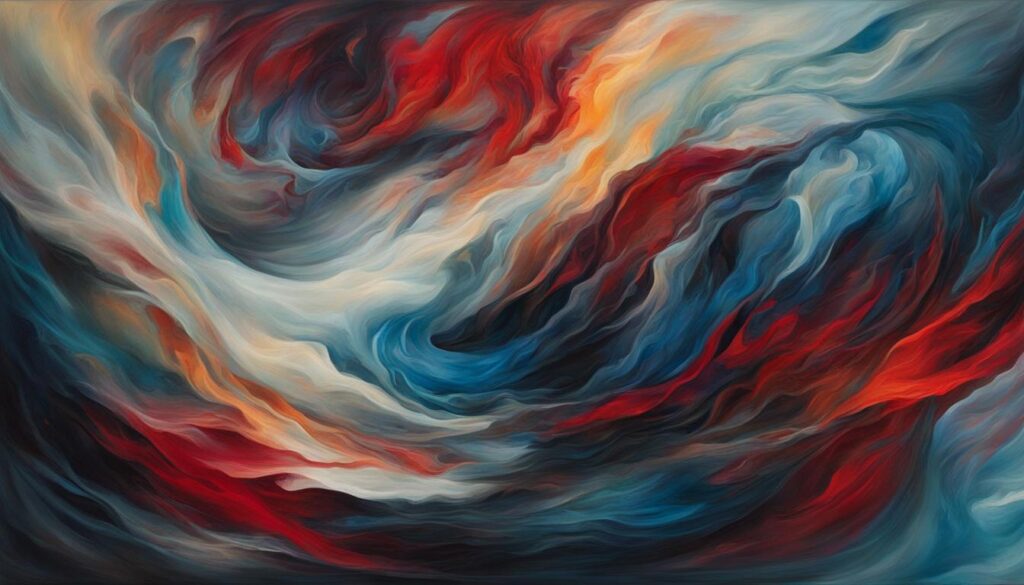Have you ever woken up from a dream feeling unsettled, especially after experiencing the loss of a loved one in your subconscious world? I surely have, and it’s far from uncommon. When it comes to dreams about a grandfather passing away, the world of dream interpretation sheds light on the deeper issues at play. Utilizing Jungian analysis, we begin to unpack the layers of dream symbolism, revealing insights that go beyond the apparent narrative of the dream. It’s not about somewhat eerie predictions, but rather about understanding psychological dream analysis as a form of exploring the emotions and motifs lurking in the depths of our psyche.
Remember, my role here isn’t to dictate the dream’s meaning but to help you find resonance. So, take a moment and consider the last dream that lingered with you through the day. Was it a snippet of memory involving your grandfather? Whatever it was, let’s take this step together to comprehend the elaborate messages bubbling up from our subconscious.
Key Takeaways
- Embrace dream interpretation as a personal and transformative experience.
- Recognize the significance of a grandfather passing away dream in the context of our inner world.
- Appreciate Jungian analysis for its contribution to uncovering latent dream symbolism.
- Understand that psychological dream analysis is a reflective, not predictive, tool.
- Remember that authentic dream interpretation must resonate with the dreamer’s feelings.
- Consider dreams as profound commentaries on our psyche rather than directives for action.
- Value dreams for their role in illuminating the dialogue between our unconscious material and conscious life.
The Emotional Impact of Dreaming About Grandfather Dying

When I dream about the loss of my grandfather, it feels like my subconscious is hosting a solemn ceremony, an intimate gathering where I’m grappling with the notion of permanence and the void left behind. Loss and attachment form a dance, often guiding the grieving process in dreams, extending an invitation for my emotions to manifest in a realm free of the critical eyes of society. My response to these dreams is uniquely mine, but they share a universal thread that connects the hearts of all who experience them.
Understanding Our Feelings Towards Loss
Loss is a universal experience, and yet, when it winds its way into my dreams, it becomes a deeply personal encounter. Emotions that I might not even be consciously aware of, surface in the safety of dreamland, providing a space for an emotional response that I might be reluctant to express in waking life. The death of a loved one—especially a figure like a grandfather, so often associated with wisdom and stability—can shake the foundations of my world, prompting questions about my own existence and the nature of attachment.
I know that dreams aren’t just random firings of a sleeping brain but poignant reflections of my innermost thoughts and feelings. They can serve as a window, not just into my psyche, but into the collective unconscious that we all share.
Navigating the Process of Grieving in Dreams
Each dream grieving stage seems to align with the phases of waking grief, providing a strange comfort in the fluid boundary between sleep and consciousness. I may dream of my grandfather’s guidance on nights when loss feels like an insurmountable mountain, or dream of his passing during times of change, each dream underscoring my emotional coping with death.
In the dream state, I’m afforded the chance to hug him goodbye, to express love unspoken, to confront fears about mortality, and to process the finality of death. Dream impacts on grief illuminate the path I’m navigating—sometimes clear as day, other times shrouded in a fog that only lifts with the morning light.
- Dreaming allows me to process grief without the constraints of reality.
- It provides a stage to rehearse coping mechanisms, strengthening my resolve when faced with actual loss.
- These nocturnal narratives may depict final interactions, symbolic farewells, and unresolved conversations.
| Grieving Stage in Dreams | Emotional Response | Coping with Death |
|---|---|---|
| Denial | Searching for a loved one in dreamscapes, refusing to accept their absence. | Finding alternative narratives within the dream to explain the loss. |
| Anger | Frustration at the dream loss can manifest in tense or chaotic dream scenarios. | Confronting the source of anger in the dream can lead to calming resolutions upon waking. |
| Bargaining | Negotiating scenarios in dreams in hopes of a different outcome. | These dreams offer insight into my desires and help prepare for acceptance. |
| Depression | Recurring dreams of isolation or desolation, reflecting inner sadness. | Recognizing these feelings in dreams aids in processing them consciously. |
| Acceptance | Peaceful, resolution-filled dreams that offer comfort and closure. | Dreams become less frequent as acceptance solidifies, signaling a shift into healing. |
Dreams offer a rich tapestry of insight and healing potential, capturing the essence of the grieving process in a uniquely compelling form. My own experience in interpreting these nighttime visions reminds me that even as we sleep, our inner lives continue their relentless pursuit of understanding, growth, and ultimately, peace.
Unpacking the Symbolism in Dreams of Loss
There’s a poignant narrative that unfolds when I’m suspended in the dream world, where the loss of my grandfather comes to life. These dreams are so much more than mere echoes of my day; they pulsate with emotional significance and symbolism that merits serious reflection. Dreaming of a grandfather’s death can feel like the subconscious mind’s way of honoring an influential life, or processing the inevitability of life transitions.
Analyzing the Role of Grandfather Figures in Dreams
When I decipher the patterns and symbols in my dreams, I often find a blend of grandfather symbolism and archetype analysis. My grandfather’s image may serve as an authoritative figure in dreams, infusing the narrative with wisdom and moral guidance, or serving as a protector. There are times when he represents an anchor to my heritage, evoking memories and ties that are part and parcel of who I am.
As I venture through the domain of dreams, every image of my grandfather feels like a fragment of an intricate mosaic, capturing both personal milestones and collective archetypal symbols.

It isn’t just about the individual qualities he possessed; in my dreamscapes, my grandfather often embodies larger archetypal symbols that resonate with human experience across cultures and time. The symbolism might spotlight the end of an era, legacy, or the passage of time, always tethered to the notion of life moving forward.
The Jungian Perspective on Death and Transition
Jungian dream interpretation takes these dreams a step further, viewing my grandfather’s death as a signal of deep, personal transformation. Carl Jung believed that death in dreams often marks a significant shift, like the end of one chapter of life, paving the way for something new to emerge. It reflects the very nature of psychological transformation, where the end of something familiar makes room for growth and self-discovery.
- The dream where I bid farewell to my grandfather might coincide with pivotal life transitions, stirring within me the courage to embrace change.
- These dreams often signal a subconscious readiness to step into uncharted territory, be it career changes, personal development, or shifts in core beliefs.
| Dream Symbol | Grandfather as an Archetype | Emotional Reflections |
|---|---|---|
| Grandfather’s Wisdom | The Sage, conveying insights and foresight | Respect for past experiences shaping my future |
| End of an Era | The Ruler, representing completion and culmination | Contemplation on the cycle of life and my place within it |
| Death and Transition | The Phoenix, signifying transformation and renewal | Anchoring self-identity amidst inevitable change |
Diving into the layers of dreams where my grandfather passes away, I invite introspection on the raw nature of my emotional landscape. Each encounter within the dream is a narrative sprinkled with psychological transformation, encouraging me to integrate different aspects of my life with newfound wisdom and maturity. Indeed, as much as these dreams may echo loss, they also sing of legacy and renewal, prompting me to carry forward the lessons imparted by one of my life’s most authoritative figures.
The Relationship Between Dream Interpretation and Sleep Cycles
Ever ponder why some dreams stick with us long after we’ve shaken off the shroud of sleep, while others fade as quickly as a morning mist? I’ve noticed that my ability to recall dreams—not to mention their vividness and emotional punch—seems intricately tied to this mystical dance between the NREM and REM stages of sleep. It’s fascinating how our sleep cycles impact on dreams, framing the theater of the night where our subconscious revels without restraint.
Delving deeper into the nocturnal narrative, I’ve realized that dreams occurring during REM sleep dreaming are particularly striking. It’s as if my brain kicks into high gear, painting dreams with bold, electric strokes. These are the dreams that I tend to remember upon waking—likely because, during REM sleep, my brain’s activity mirrors that of being awake, blessing me with the gift of clear dream recall.
But let’s flip the coin. The overshadowed cousin, NREM sleep, also holds its own enigmatic sway over my nightly visions. Though these dreams often lack the flashy charisma of their REM counterparts, they weave stories throughout the initial sleep phases and into the deeper, more restorative stages.
As I drift through the tides of NREM and REM sleep, I can almost feel my mind weaving the threads of my dreams into the fabric of my reality.
The interplay between these sleep stages is essential for appreciating why we dream the way we do. I’ve pieced together that the arc of the night’s journey, from NREM to the crescendo of REM sleep, sets the stage for a diverse cast of dreams—from the mundane to the awe-inspiring.
- In NREM sleep, dreams tend to be more thought-like and fragmented.
- As I transition into REM sleep, the dreams become more story-like, rich with narrative and emotional depth.
Given this duality, it’s no wonder that the moment of waking plays such a pivotal role in whether a dream etches itself into my morning or fades into the abyss. The point of arousal from these NREM and REM stages significantly influences which dreams I can retrieve from the vaults of sleep when morning light beckons.
| Stage of Sleep | Typical Dream Characteristics | Recall Potential |
|---|---|---|
| NREM Early Stages | Fleeting, thought-like fragments | Low |
| NREM Deep Stages | Muted, less emotional content | Medium |
| REM Sleep | Rich narratives, high emotional impact | High |
I’ve found that when I awaken during REM sleep dreaming, the dreams are often at the forefront of my mind, painted vividly enough to linger through the day. It’s not just the content that stays with me—the feelings intertwined within those dreams resonate deeply, a testament to the profound connection between sleep cycles and emotional dream recall.
Ultimately, understanding the nuances of sleep architecture enriches the tapestry of dream interpretation. As I move between the worlds of NREM stillness and REM spectacle, I’m reminded that every dream reflects a unique moment in my sleep cycle journey—a journey that’s as rejuvenating for my body as it is revelatory for my spirit.

How Dreams Communicate Unconscious Material
Have you ever considered that every night, you’re essentially laying out a welcome mat for the enigmatic visitor we call dreams? It’s as if our subconscious has its own language, a form of unconscious messaging that whispers secrets to us while we slumber. Through personal dream analysis, I’ve come to realize that these dream encounters are intricate narratives, rich with insight from dreams waiting to be interpreted.
Deciphering the Messages from Your Unconscious Mind
Each night, the mind embarks on a journey, scripting stories that touch on our anxieties, desires, and everything in between. As I’ve delved into interpreting dream content, I’ve found that dreams are the psyche’s means of processing the day’s emotional residue. They can offer clarity or sow confusion, depending on how receptive we are to their symbolism. It’s like a personal session of Psychic self-reflection, with each dream providing a cipher key to unlocking deeper inner truths.
Our dreams are the mind’s abstract artists—splashing thoughts and emotions onto the canvas of our sleep, waiting for us to interpret their significance.
Dreams as a Reflection of Inner Psychic States
In my journey, I’ve seen how dreams mirror our inner state representation, painting pictures of our fears and wishes. The subconscious mind uses dreams to cast reflections of who we are, what troubles us, or what we deeply aspire for. Dream significance becomes apparent when we commit to unraveling these nocturnal tales. Like dedicated detectives, we search for clues that reveal our internal dynamics.
Now, let’s look at the following tale to highlight the diagnostic tools dreams provide:
| Dream Element | Possible Subconscious Meaning | Personal Insight Gained |
|---|---|---|
| Water engulfing my path | Emotional overwhelm or unresolved issues | Recognition of my need to confront anxieties |
| Flying effortlessly over a city | A desire for freedom or escape from constraints | Understanding my need to break free from limiting beliefs |
| Encountering a locked door | Obstacles in personal growth or withheld opportunities | Acknowledging barriers I’ve set for myself |
Such moments of insight are invaluable, aren’t they? They resemble puzzle pieces that, once put together, reveal a dialogue with our deepest selves. And these aren’t merely throwaway scenes from the theater of the mind; they’re pathways to healing and understanding. The power and beauty of dreams are that they offer the most authentic representation of our subconscious experiences, often leaving me in awe of their capability to facilitate personal healing and contribute to the broader process of individuation.

- Dreams are the emissaries of the unconscious, carrying messages ripe for interpretation.
- Engaging in dream interpretation can foster profound psychic self-reflection.
- The significance of dreams extends beyond their symbolism, reflecting our most genuine inner states.
- A mindful approach to our dream content can be therapeutic, aiding in our personal growth.
As a good friend, I can tell you the experience is both mysterious and illuminating—like wandering through a gallery where each piece of art narrates a fragment of your hidden narrative. So the next time you dream, remember it’s more than a fleeting thought or a silent movie; it’s a conversation with your inner self, filled with metaphors and symbols that reveal the intricate landscape of your psyche. Treasure these messages, for they are part of the incredible journey to understanding the deeper you.
Conclusion
As we edge towards the close of this exploration, it’s clear that understanding dreams, particularly those as emotionally charged and symbolically rich as dreaming of the loss of a loved one, offers a remarkable opportunity for personal growth. Engaging earnestly with these nocturnal narratives enables us to dive deep when interpreting the unconscious, peeling back layers to uncover the psychological significance of dreams. It’s akin to being an archaeologist in the vast ruins of our psyche, where every symbol unearthed has the potential to enlighten our waking journey.
Through the lens of dream interpretation, not only do we touch upon the profound, but we also cultivate a sacred space for self-reflection and healing. Each remembered dream is like a beacon, illuminating the gems of insight veiled within our unconscious, reminding us of the importance of paying attention to the soft whispers of our sleeping mind. Whether it’s a vivid show under the REM spotlight or a fragmented vignette from the depths of NREM, every dream sequence bears the capacity to echo our intrinsic emotional state – the unvarnished truth of who we are.
Ultimately, the act of discerning our dreams calls us to honor the stories that shape us, encouraging us to lean into the discomfort and curiosity that true introspection invites. It’s about respecting the profound dialogue between our unconscious and conscious selves, nurturing a connection that is as mystifying as it is enlightening. So, as we move forward from here, may we all carry with us the courage and curiosity to interpret the messages in our dreams, for they are invaluable guides on our quest for understanding, direction, and authenticity.
FAQ
What could it mean if I dream about my grandfather dying?
Dreaming about your grandfather passing away could symbolize a variety of things, such as grappling with the concept of loss itself, considering your own emotions toward the end of something significant in your life, or it might be your psyche’s way of preparing you for a transition. It’s deeply personal, though, and can tap into what a grandfather figure represents to you, like wisdom, time’s passage, or legacy.
How can dreaming of a loved one dying affect my emotions?
These dreams can be intense, no doubt. They might be a reflection of your grief and allow you to process complex feelings like sadness, fear, or anxiety. Sort of like your brain’s safe space to work through tough emotions. Just remember, it’s normal to feel a bit shaken up after a dream like this, even if it’s not a reflection of reality.
What do grandfathers represent in dreams?
Grandfathers can be packed with symbolism in dreams. They often stand for wisdom, the impacts of time, or could be a nod to your heritage and personal history. They could also represent qualities or influences that your own grandfather, if you had a close relationship with him, might have had on you.
Can you explain the Jungian perspective on dreaming about death?
In Jungian analysis, death isn’t just about loss; it’s a symbol of transformation and change. So, if you’re dreaming about a grandfather dying, it might suggest you’re experiencing or anticipating a major shift in your life. It could be an end of one chapter and the beginning of another, and your subconscious might be nudging you to come to terms with this change.
Why is understanding sleep cycles important for dream interpretation?
So, sleep cycles are super interesting when it comes to dreams. Most of our dreams happen during REM sleep, which is when your brain is buzzing with activity. It’s during this stage that dreams are more vivid, and if you wake up during or right after REM, you’re way more likely to remember the dream. Knowing which sleep stage you were in can give you clues about how much weight to give your dream, emotionally speaking.
How do dreams communicate unconscious thoughts?
Dreams are like a no-filter Instagram story for your subconscious. They’re raw and real, presenting our inner conflicts, desires, and thoughts in a symbolic form that isn’t warped by our waking ego’s defenses. When you crack the code of your own dream symbols, it’s like getting a sneak peek into what’s going on deep inside your psyche.
What does my dream about losing my grandfather say about my inner state?
If you’re dreaming about losing your grandfather, it could be revealing a bunch about what’s simmering beneath the surface for you. Maybe you’re working through feelings of loss, contemplating the effects of time and legacies, or maybe you’re internally reflecting on changes in your life. It’s like your emotions are being laid out on the table, using the symbol of your grandfather to tell the story.
Do dreams offer insight into our waking lives?
Absolutely, dreams can shine a light on issues or feelings we might be overlooking while we’re awake. They can clue us in on what’s truly bothering us or what we desire deep down. It’s like they hold up a mirror to our inner world, giving us a chance to see what’s really going on inside and potentially lead us toward personal growth and understanding.